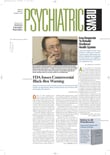Being a depressed woman is the “loneliest place in the world,” according to mother and literary agent Karen Gormandy. Yet being a depressed African-American woman is “even lonelier.”
Gormandy is a living testament to the fact that recovery from mental illness is possible, and she shared this message with attendees at a seminar held in conjunction with the 2004 annual conference of the National Alliance for the Mentally Ill (NAMI) held in Washington D.C., in September.
NAMI's Multicultural Action Center hosted the seminar, which was titled,“ African Americans: Facing Mental Illness, Experiencing Recovery” (
see facing page).
Gormandy became involved with NAMI as the mother of a son who was first diagnosed with schizophrenia and subsequently with bipolar disorder.
“My job as a family member was to be strong—to be his mother and carry the burden,” she said. “You're not allowed to be depressed when you are a single mother, the sole provider. You are not allowed to be depressed when you are a minority.”
Yet there was no ignoring the “long, slow fall” into depression that robbed her of her high school and college years.
Gormandy, a member of the “perfect family who came to America” from Trinidad, was expected by her parents to “fit into society, not get into trouble, and be brighter than everyone else in the class,” she said.
Then her mother left. “I felt my mother left because I was unlovable,” she said.
Gormandy soon became disinterested in school and began cutting classes. Eventually she skipped school altogether.
“Pretty soon I couldn't get out the front door,” she said. Things went downhill from there.
“I spent the entire 10th grade in bed,” she said. Gormandy hesitantly recalled the year that “was like living in a bubble.”
When light entered her room, it was not comforting but“ blinding,” she said, and voices were muffled.
“The whole world was happening to other people,” she said.“ I was not part of anything. It was like being the living dead.”
Eventually Gormandy did get out of bed and finished high school, but faced her second episode of major depression as a college student in Montana, after her husband left her. She was absent from classes and was given academic probation.
“Montana isn't the best place to get depressed,” she said.“ There are no people around, and no one realizes you are missing. The phone never rang.”
This time, however, Gormandy had to get out of bed to take care of her young son.
Today, she said, “the way I survive is by being part of the community, by being involved in NAMI, and by having an outstanding therapist who pulls me back every time I walk to the edge.”
Gormandy doesn't dwell on the past, she said, nor on the future. “I take life one day at a time and appreciate the small joys I've been given. I have an incredible source of love and support from friends and from NAMI,” she declared. ▪
